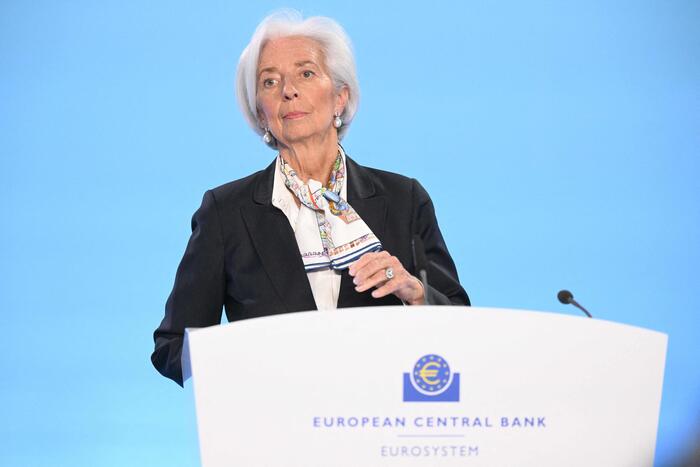Fight against inflation - economic expert: "ECB must accept collateral damage"
Created: 06/08/2022, 10:00 am
By: Andreas Hoess
Economic researcher Friedrich Heinemann warns that the ECB could lose control of price stability.
© Schöning/Imago Images
The European Central Bank could lose control of price stability, economic researcher Friedrich Heinemann warns in an interview with the newspaper Münchner Merkur.
Munich/Frankfurt – High inflation is forcing the European Central Bank (ECB) to act.
Despite this, she will probably not raise interest rates at her meeting on Thursday.
Professor Friedrich Heinemann from the Center for European Economic Research (ZEW) explains why.
The monetary policy expert believes the ECB is making a huge mistake.
ZEW expert Heinemann: "See signs of a wage-price spiral in Germany, too"
Mr. Heinemann, the ECB must combat high inflation.
However, it does not want to raise interest rates until July.
Why not now?
The ECB has set a roadmap.
It looks like this: First, it will end its purchases of securities such as government bonds, then it will raise interest rates.
In the coming meeting, she will therefore first announce the early end of the purchase of securities, and then raise interest rates in July.
Inflation is already at eight percent.
Doesn't she have to act faster?
The ECB is already acting faster than it initially wanted, but is still caught in its own trap: it made the mistake of switching much too late and now has to follow its roadmap to remain reliable.
The camp around chief economist Philip Lane in particular has assumed for far too long that the high inflation is temporary.
It was recited almost like a mantra.
As recently as December, Lane had very optimistic inflation forecasts that turned out to be wrong.
Now a debate is finally raging in the Governing Council of the ECB, some even want to raise the key interest rate by 0.5 instead of the usual 0.25 percent.
But they are still in the minority.
The US hiked rates much earlier, in March.
Since then, they have consistently taken action against inflation.
What is different there than in Europe?
The ECB has long argued that the labor market in Europe is not overheating like in the US, which is why the US Federal Reserve must take more countermeasures than the ECB.
But we are also seeing increasing signs of a wage-price spiral in Europe and Germany.
German unemployment is below pre-pandemic levels.
In addition, three out of four companies complain that they cannot find skilled workers.
So the situation here is not that different.
To make matters worse, energy prices in Europe are rising much faster than in the USA as a result of the Ukraine war.
ZEW researcher Heinemann: "The ECB is reacting much too late"
So the ECB should have taken countermeasures?
You just have to say: the ECB is reacting far too late.
Many no longer really believe that the ECB will quickly get the situation under control.
You can see that in the inflation expectations, which are slowly getting out of hand.
This is extremely dangerous, because inflation is also a matter of the mind.
If you believe that things will get even more expensive in the future, then the wage demands will get even higher - and that will drive prices even more.
also read
Pensions are increasing: You will get so much more from July 2022
Hartz IV recipients should sell the house because children have moved out - the court makes a tough decision
Critics have been saying for years that the ECB is creating high inflation with negative interest rates.
Now she is there.
Is the ECB to blame?
Or is she the victim of unfortunate circumstances?
Looking back, one has to say that she did a great job in the first 20 years of the euro.
The average inflation rate was below the target of two percent, up to which one speaks of stable prices.
Now, with the boom in demand after the lockdowns, the supply chains that are still disrupted due to Corona and the rising commodity prices due to the Ukraine war, a lot is coming together.
Despite this, the ECB simply ignored or underestimated factors that drive prices up over the long term.
Which one?
The transformation to renewable energies will take years and drives up energy prices.
CO2 pricing also contributes to this.
Due to the aging of society, more and more workers are missing.
This is only going to really come to a head.
In addition, globalization has made goods cheaper and cheaper over the decades.
If it is now turned back a bit, we also feel it in our wallets, because things are becoming more expensive again.
These enduring trends are being reinforced by the pandemic and the Ukraine war.
Is the real estate bubble bursting now?
“Some will be losers in this development”
Corona, deglobalization, demographics, a war: can the ECB do anything at all against such price drivers?
Naturally!
And very effectively.
If it boldly raises interest rates, the euro, which is currently very weak internationally, will immediately appreciate.
And that, in turn, makes energy imports cheaper because we suddenly have to pay fewer euros for oil or gas.
That would be a quick dampener for inflation.
And as far as the prices for cars, travel, construction or raw materials are concerned: Of course it cannot ensure more supply here, but it can reduce demand through higher interest rates.
And that, in turn, would push prices down…
... and slow down the economy quite a bit.
Yes, that's a big challenge.
But the Maastricht Treaty gave the ECB a clear mandate to look after price stability, and with good reason.
That is their top priority.
The conflict of goals that it has to fight inflation without stalling the economy does not really exist for the ECB.
It even has to put up with an economic slump in order to keep prices stable, that's the unpleasant part of its job.
Economic growth is the task of politics - in Brussels and in the European capitals.
The prices of assets such as stocks or real estate have risen enormously over the years because of cheap money.
Could bubbles burst here if the central banks tighten the reins?
That would be a problem if banks got into trouble because of a lack of equity.
But a lot has changed since the financial crisis.
Thanks to the banking union and stricter capital requirements, the banks can now take a lot more.
But the fact that higher interest rates are now likely to end the soaring property prices is actually good news.
Because there really was a certain amount of overheating in some metropolitan areas.
Many homeowners will not see it that way.
That's true, some will be the losers in this development because the value of the property is falling or the next follow-up financing is becoming more difficult.
But: The people have taken the risks themselves, there is no zero-interest guarantee for anyone.
Here, too, the ECB has to accept collateral damage.
This is the long-overdue reassurance after a phase of exaggeration.
In addition, one cannot really speak of a real estate bubble in many cities.
Not in Munich either?
I know it's a bit different in Munich.
But Munich is not representative of Germany, nor of the eurozone.
Interview: Andreas Höss



/cloudfront-eu-central-1.images.arcpublishing.com/prisa/C3LDLHDAXBBCFCHWBPELHN64FU.jpg)





